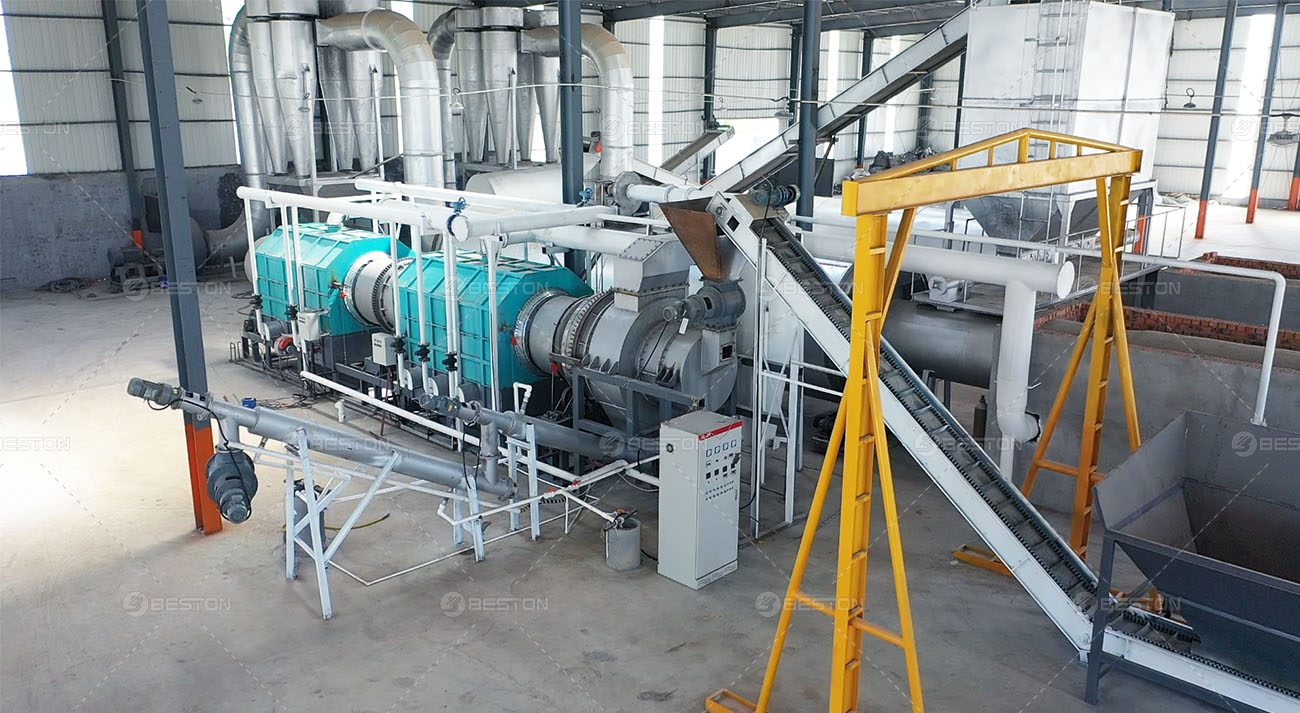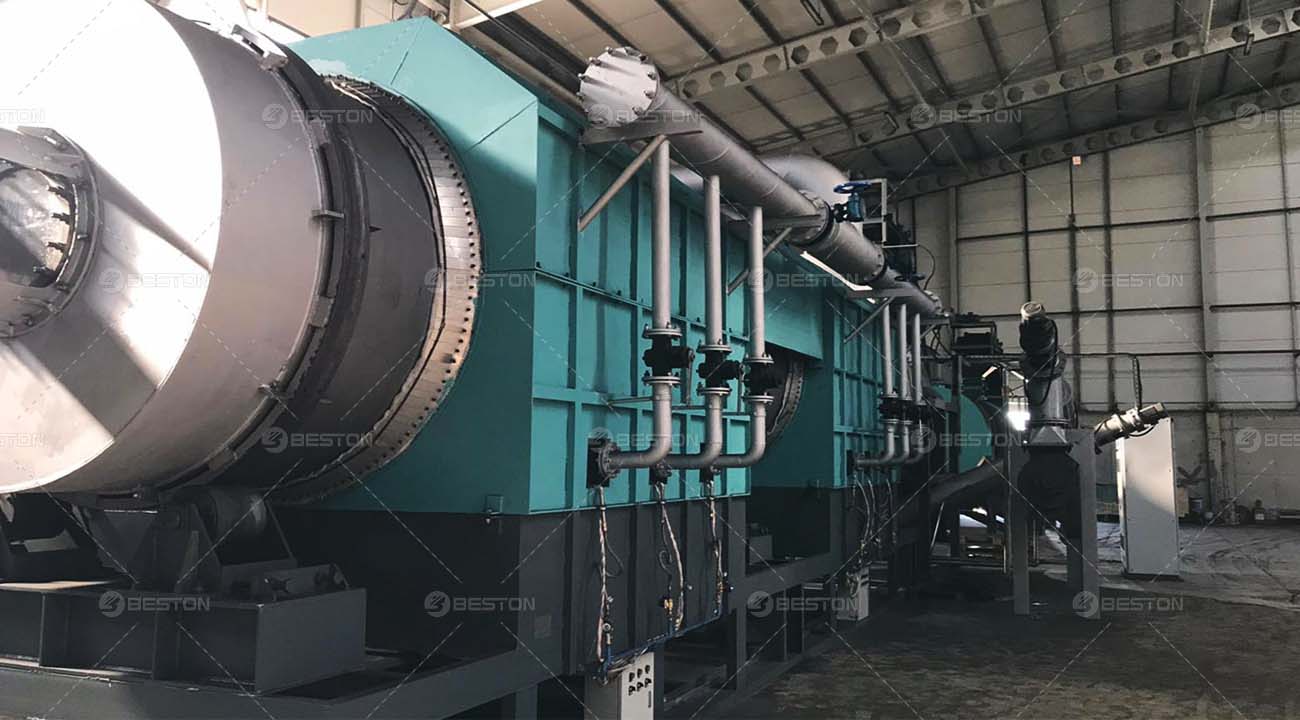Waste biomass, a resource often overlooked, can undergo a transformative journey through advanced technologies like Biomass Pyrolysis Plant, Charcoal Making Machine, and Biochar Production Equipment. In this exploration, we dissect the intricate process of converting waste biomass into valuable products, highlighting the nuances that distinguish Charcoal from Biochar.

Biomass Pyrolysis Plant: The Nexus of Transformation
A Biomass Pyrolysis Plant serves as the epicenter of this recycling endeavor. This sophisticated apparatus engages in the thermal decomposition of biomass in the absence of oxygen, a process known as pyrolysis. The objective is clear: converting organic waste into valuable carbonaceous products.
Unraveling Pyrolysis: A Thermal Metamorphosis
The heart of the Biomass Pyrolysis Plant lies in its ability to subject biomass to high temperatures, initiating a series of complex chemical reactions. The absence of oxygen prevents complete combustion, paving the way for the creation of bio-based materials such as Charcoal and Biochar.
Beyond Traditional Waste Management
Traditional waste management often involves disposal in landfills or incineration, contributing to environmental concerns. The Biomass Pyrolysis Plant, however, transcends these practices, offering a sustainable alternative that not only manages waste but also creates valuable resources.
Charcoal Making Machine: Crafting Carbon Brilliance
Within the realm of biomass pyrolysis, the Charcoal Making Machine emerges as a crucial player. It takes the raw output of pyrolysis, typically known as bio-oil or pyrolysis oil, and transforms it into the familiar and versatile substance known as Charcoal.
The Carbon Alchemy
The distinction between Charcoal and Biochar begins to surface in the Charcoal Maker Machine. Here, the focus is on the production of a carbon-rich material characterized by its high carbon content, creating a substance sought after for its energy density and various applications.
Difference Between Charcoal and Biochar: A Carbonic Divide
The crux lies in the difference between Charcoal and Biochar. While both are products of pyrolysis, Charcoal leans towards being a fuel source, often utilized for heating and cooking due to its energy-rich nature. It embodies a familiar blackened residue associated with barbecues and grilling.
Biochar Production Equipment: Nurturing Soil and Sustainability
On a parallel track, Biochar Production Equipment takes center stage in the creation of Biochar—a distinct carbonaceous material with unique applications, especially in agriculture and environmental remediation.
Biochar’s Agricultural Affair
Biochar, unlike traditional Charcoal, undergoes specific treatments and is designed for soil enrichment. The Biochar Production Equipment ensures the creation of a porous and stable material that acts as a soil conditioner, enhancing water retention and nutrient availability for plants.
A Green Residue: Biochar’s Environmental Symphony
While Charcoal tends to leave a blackened residue, Biochar leaves a green imprint on environmental sustainability. It aligns with the ethos of circular economy practices by not only managing waste but also contributing to soil health and carbon sequestration.
Choosing the Right Path: Charcoal or Biochar?
In the journey from waste biomass to valuable resources, the decision to produce Charcoal or Biochar hinges on specific needs and applications. It’s a matter of aligning the output with the desired environmental and industrial outcomes.
The Energy Bridge: Charcoal’s Role
Charcoal, with its high calorific value, serves as an energy bridge, catering to industries and households seeking efficient fuel sources. Its combustion properties make it an ideal candidate for heating applications, providing a sustainable alternative to conventional fossil fuels.
Soil Guardian: Biochar’s Agricultural Impact
On the other side of the spectrum, Biochar steps in as a soil guardian. Its unique structure enhances soil fertility, improves water retention, and contributes to carbon sequestration. The Biochar Production Equipment plays a pivotal role in tailoring the characteristics of Biochar for optimal soil interactions.
Beyond Keywords: Embracing Sustainable Practices
As we navigate the landscape of waste biomass recycling through Biomass Pyrolysis Plants, Charcoal Making Machines, and Biochar Production Equipment, it becomes evident that this journey extends beyond mere keywords. It embodies a commitment to sustainable practices, resource optimization, and environmental stewardship. Specific recycling methods require professional solution providers, and Beston Group is a good choice.

In this intersection of technology and ecology, the production of Charcoal and Biochar becomes a harmonious symphony—an orchestration of waste-to-value that not only meets industrial needs but also contributes to a greener, more sustainable future.